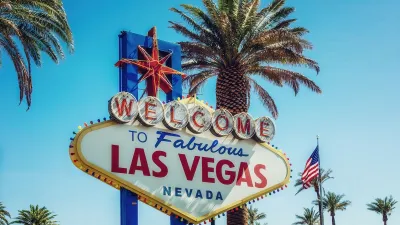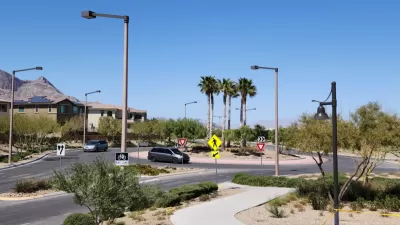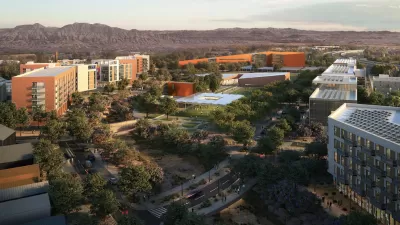Las Vegas has always epitomized American excess. But with its water supply running out and its constant illumination warming the planet, it also represents the extent of our economic and ecological unsustainability.
"There is something especially unsettling about visiting Las Vegas these days -- and it is not the town's lascivious culture. A voyage to Sin City in this moment of ecological and economic crisis is a journey to a giant concave mirror reflecting back the magnified -- and ugly -- truths about this epoch of cataclysmic consumption and hubristic hedonism.
Like most flights into Vegas, mine last week soared over a shrinking Lake Mead. Visually, the white strip around the manmade reservoir is beautiful -- the bright chalk line separating the blue water from the red-brown desert evokes memories of a Bob Ross pastel painting minus "happy trees." But it is a menacing harbinger of depletion. This water source for 22 million people is at its lowest level since the 1960s. Strained by the Southwest's population explosion and by drought-accelerating climate change, the lake now stands a 50 percent chance of running dry by 2021, according to scientists.
Whether hanging Christmas lights in Toledo, buying SUVs in Boulder, taking long showers in Atlanta, residing in sprawly suburbs near Chicago, or overspending anywhere, we are all Las Vegans now. And because we have become so environmentally and economically interconnected, what happens in our own Vegas no longer stays in our own Vegas -- it affects everyone."
FULL STORY: Leaving Las Vegas: Are Americans Ready to Put Cataclysmic Consumption and Hedonism Behind Them?

Alabama: Trump Terminates Settlements for Black Communities Harmed By Raw Sewage
Trump deemed the landmark civil rights agreement “illegal DEI and environmental justice policy.”

Planetizen Federal Action Tracker
A weekly monitor of how Trump’s orders and actions are impacting planners and planning in America.

The 120 Year Old Tiny Home Villages That Sheltered San Francisco’s Earthquake Refugees
More than a century ago, San Francisco mobilized to house thousands of residents displaced by the 1906 earthquake. Could their strategy offer a model for the present?

In Both Crashes and Crime, Public Transportation is Far Safer than Driving
Contrary to popular assumptions, public transportation has far lower crash and crime rates than automobile travel. For safer communities, improve and encourage transit travel.

Report: Zoning Reforms Should Complement Nashville’s Ambitious Transit Plan
Without reform, restrictive zoning codes will limit the impact of the city’s planned transit expansion and could exclude some of the residents who depend on transit the most.

Judge Orders Release of Frozen IRA, IIJA Funding
The decision is a victory for environmental groups who charged that freezing funds for critical infrastructure and disaster response programs caused “real and irreparable harm” to communities.
Urban Design for Planners 1: Software Tools
This six-course series explores essential urban design concepts using open source software and equips planners with the tools they need to participate fully in the urban design process.
Planning for Universal Design
Learn the tools for implementing Universal Design in planning regulations.
Clanton & Associates, Inc.
Jessamine County Fiscal Court
Institute for Housing and Urban Development Studies (IHS)
City of Grandview
Harvard GSD Executive Education
Toledo-Lucas County Plan Commissions
Salt Lake City
NYU Wagner Graduate School of Public Service





























